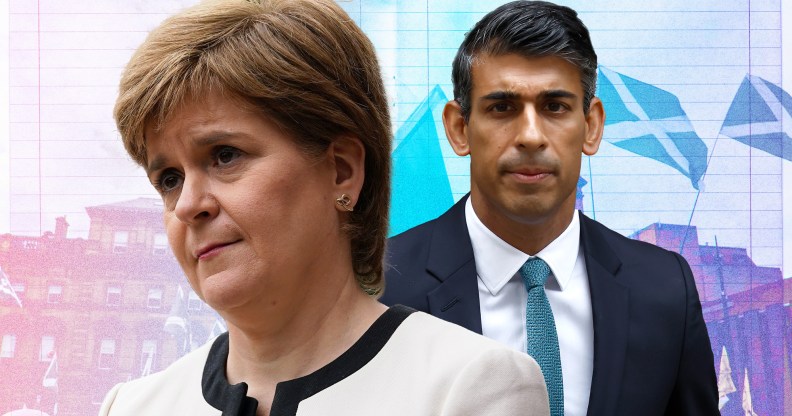Nicola Sturgeon blasts Tory government for blocking Scottish gender bill: ‘An attack on democracy’

Nicola Sturgeon and Rishi Sunak (Credit: Getty Images)
Scotland’s first minister Nicola Sturgeon has condemned the UK government’s move to block the Scottish parliament’s gender reform bill as a “full-frontal attack on democracy”.
Scottish secretary in Westminster Alister Jack announced on Monday (16 January) that the UK government was making the unprecedented move to block Scotland’s vital and long-overdue reform of its gender recognition laws.
Holyrood passed the Gender Recognition Reform (Scotland) bill on 22 December by 86 votes to 39 to make it simpler and fairer for trans people to update the sex marker on their birth certificates.
Mr Jack confirmed that he will use a Section 35 order under the Scotland Act to prevent the Scottish bill from becoming law because he is “concerned that this legislation would have an adverse impact on the operation of Great Britain-wide equalities legislation”.
This is despite Scotland’s gender bill having no effect on the UK Equality Act whatsoever.
Taking to Twitter, Nicola Sturgeon blasted Rishi Sunak’s Tory government for its “attack on our democratically elected Scottish parliament and its ability to make its own decision on evolved matters”.
She added: “The Scottish government will defend the legislation and stand up for Scotland’s parliament.
“If this Westminster veto succeeds, it will be the first of many.”
It will be the first ever use of a Section 35 order since devolution of power to the Scottish parliament under the Scotland Act of 1998. The act gives the UK government the power to intervene on bills “which the secretary of state has reasonable grounds to believe would be incompatible with any international obligations or the interest of defence or national security”.
Mr Jack said he had not taken the decision to enact Section 35 lightly. “Transgender people who are going through the process to change their legal sex deserve our respect, support and understanding,” he said.
“If the Scottish government chooses to bring an amended bill back for reconsideration in the Scottish parliament, I hope we can work together to find a constructive way forward that both respects devolution and the operation of UK parliament legislation.”
The Gender Recognition Reform (Scotland) bill was passed to make the acquisition a Gender Recognition Certificate (GRC) simpler, removing the need for a medial diagnosis of gender dysphoria – in line with the advice from the World Health Organization – and lowering the age that people can apply for a GRC from 18 o 16.
Having a GRC allows trans people to update their birth certificate, get married or form a civil partnership in their affirmed gender, update their marriage or civil partnership certificate, and have their affirmed gender on their death certificate when they die.
It has been wrongfully suggested by both prime minister Sunak and Labour leader Keir Starmer that the Scotland gender bill would have a negative impact on single-sex spaces. Trans people are able to access spaces in line with their gender identity without a GRC.
Nicola Sturgeon added that, in her view, “there are no grounds to challenge this legislation”.
She added: It is within the competence of the Scottish parliament, it doesn’t affect the operation of the Equality Act and it was passed by an overwhelming majority of the Scottish parliament after very lengthy and very intense scrutiny by MSPs of all parties represented in the parliament.”
Maggie Chapman MSP, equalities spokesperson for the Scottish Greens, told PinkNews that the Tory government could “destroy devolution” if it tried to stop Scotland’s gender reform bill. She also warned that intervention could trigger a bitter legal battle.
“If they actually go through with their threat to either block the bill from receiving royal assent or block the implementation of it… I think that signals that this becomes about something much more than the issue of self-declaration – this becomes a constitutional crisis, I think,” Chapman told PinkNews.
Jayne Ozanne, a former equalities advisor to the Tory government, said she “couldn’t believe” the prime minister had signed off on Section 35 being invoked “to undermine trans people’s rights”.
“This is a very dark day,” she said. “All will rightly wonder why [Sunak] has chosen to focus on one of the most marginalised and misunderstood groups in our society at a time of crisis in both our NHS and public services.
“I believe it is the beginning of the end for the United Kingdom, and few will forgive him for it.”
How did this story make you feel?

